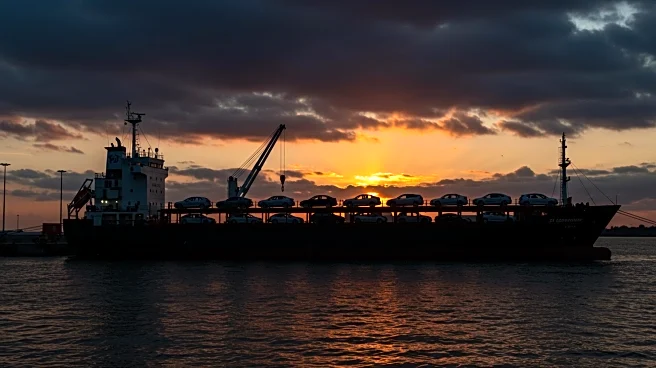What's Happening?
Alaska Marine Lines has announced it will no longer transport electric vehicles (EVs) and plug-in hybrid electric vehicles (PHEVs) due to concerns over fire risks associated with lithium-ion batteries. This decision affects their cargo barge services across Alaska and to Hawaii, which are crucial for moving commercial freight and personal goods. The company cited the complexity and potential danger of lithium-ion battery fires, which are difficult to extinguish at sea, as the primary reason for this policy change. The suspension is effective immediately for Central and Western Alaska and Hawaii, with a grace period until September 1 for Southeast Alaska. The policy does not affect other hybrid vehicles, smaller electric recreational vehicles, e-bikes, and four-wheelers. Alaska Marine Lines plans to reassess the situation as industry safety standards evolve.
Why It's Important?
The suspension of EV transport by Alaska Marine Lines highlights the ongoing challenges and safety concerns associated with lithium-ion batteries in maritime shipping. This decision could impact the growing popularity of electric vehicles in regions like Southeast Alaska, where alternative transport options are limited. The policy aligns with similar actions by other carriers, such as Matson, which also ceased EV transport to Hawaii and Guam. The move underscores the need for improved safety measures and industry standards to manage the risks of transporting EVs by sea. Stakeholders, including EV manufacturers and consumers, may face logistical challenges and increased costs as a result.
What's Next?
Alaska Marine Lines will continue to monitor industry developments and safety protocols to determine if and when it can safely resume EV transport. The company’s decision may prompt other carriers to reevaluate their policies on transporting EVs. Additionally, the State of Alaska’s Marine Highway System will maintain limited EV transport with special precautions, potentially serving as a model for other transport services. The broader shipping industry may see increased pressure to develop and implement more robust safety measures for lithium-ion battery transport.








